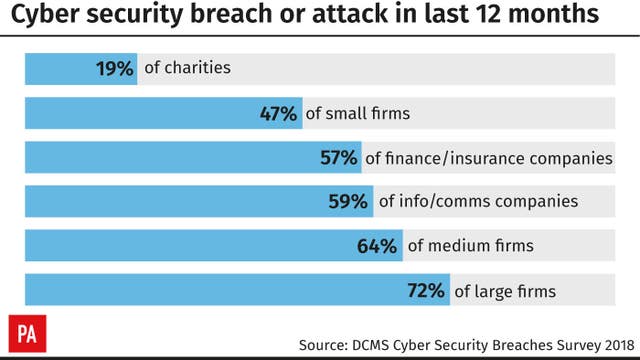
One in five charities and nearly half of businesses in the UK have been hit by a cyber security breach or attack in the last year, an official survey shows.
The Government report detailed how organisations of all sizes are at risk of being targeted by fraudsters and hackers.
For the first time the 2018 edition of the Cyber Security Breaches Survey examined the impact on the charitable sector.
It found that 19% of charities and 43% of businesses reported experiencing cyber security breaches or attacks in the last 12 months.
 (PA Graphics)
(PA Graphics)
This rises to seven in 10 (72%) among large businesses and a similar proportion (73%) among the largest charities with incomes of £5 million or more.
The most common breaches or attacks involved fraudulent emails, attempts by scammers to impersonate the organisation online and viruses and malware.
As a result of incidents files were temporarily or permanently lost, software or systems were corrupted, firms or charities had their website slowed or taken down and money, assets or intellectual property was stolen.
Typically, organisations incur no specific financial cost from cyber security breaches, according to the report.
But it said that where breaches do result in a “material outcome”, the costs can be significant.
The average financial impact was £3,100 for businesses and £1,030 for charities, the study published by the Department for Digital, Culture, Media and Sport found.
It concluded that businesses and charities need to consider their “organisational cultures”, saying some organisations continue to see themselves as “offline” or too small to be at risk.
Charities are typically behind businesses when it comes to seeking information, advice or guidance, training staff and having written policies on cyber security, the paper said.
The findings follow a warning from intelligence officials that charities holding vast quantities of personal data and payment information are at risk of potentially devastating online attacks.
In one case flagged up in that report, published last month, a charity lost £13,000 after its chief executive’s email was hacked.


Why are you making commenting on The Herald only available to subscribers?
It should have been a safe space for informed debate, somewhere for readers to discuss issues around the biggest stories of the day, but all too often the below the line comments on most websites have become bogged down by off-topic discussions and abuse.
heraldscotland.com is tackling this problem by allowing only subscribers to comment.
We are doing this to improve the experience for our loyal readers and we believe it will reduce the ability of trolls and troublemakers, who occasionally find their way onto our site, to abuse our journalists and readers. We also hope it will help the comments section fulfil its promise as a part of Scotland's conversation with itself.
We are lucky at The Herald. We are read by an informed, educated readership who can add their knowledge and insights to our stories.
That is invaluable.
We are making the subscriber-only change to support our valued readers, who tell us they don't want the site cluttered up with irrelevant comments, untruths and abuse.
In the past, the journalist’s job was to collect and distribute information to the audience. Technology means that readers can shape a discussion. We look forward to hearing from you on heraldscotland.com
Comments & Moderation
Readers’ comments: You are personally liable for the content of any comments you upload to this website, so please act responsibly. We do not pre-moderate or monitor readers’ comments appearing on our websites, but we do post-moderate in response to complaints we receive or otherwise when a potential problem comes to our attention. You can make a complaint by using the ‘report this post’ link . We may then apply our discretion under the user terms to amend or delete comments.
Post moderation is undertaken full-time 9am-6pm on weekdays, and on a part-time basis outwith those hours.
Read the rules here